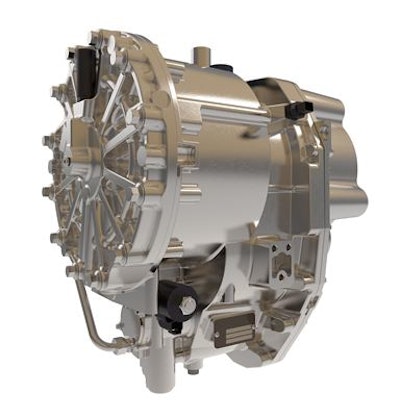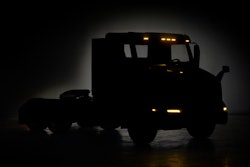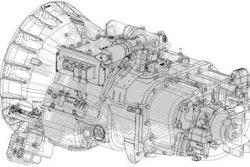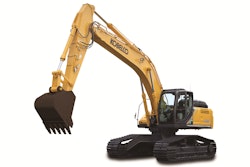
Flybrid will present its flexible and modular flywheel hybrid technology at the IMechE’s Off-Highway Vehicles seminar in Birmingham, UK on April 25.
The off-highway market is characterized by a large variety of specialized machines designed for a diverse range of tasks. In order to cater for this broad range of machines, Flybrid has developed a standardized and modular family of flywheel hybrid systems. In the 600 Series of flywheel hybrid products, Flybrid covers energy storage requirements from 150-600 kJ in three flywheel specifications. The 600 Series products feature common flywheel tooling, flywheel housings, ancillaries and sensors to enable higher production volumes for these common parts and as a result faster payback times for Flybrid’s customers.
All of Flybrid’s standard, modular systems can be connected to an off-highway machine either through standard third party hydraulic pump/motors, electric motor/generators or a variable mechanical transmission.
“The first system that is market-ready, the H-380, has a power capacity of 210 kW, and stores 380 kJ of energy. Such a system is well suited for excavators from 20-45 t in weight and for wheeled loaders between 75 and 225 kW of power,” explains Tobias Knichel, Flybrid’s Business Development Director.
The ‘H’ in H-380 designates a module integrated through the machine’s hydraulic system by using a standard variable displacement pump.
“A Flybrid hybrid system reduces operating costs by boosting performance,” explains Knichel. “It improves efficiency in two ways: by capturing energy that would otherwise be wasted during a vehicle’s operating cycle, and releasing it during the next cycle, and by providing an on-board power boost which means that engines can often be downsized or downspeeded to further improve fuel consumption. This provides a combination of high versatility and short payback time that is unprecedented for a hybrid.”
Many different applications can benefit from energy recovery; examples include raising and lowering the boom of an excavator or the mast on a reach stacker, slewing on an excavator or shuttling between forward and reverse with a loader.
Furthermore, the energy of the flywheel can be used to significantly increase the power available by pre-charging the flywheel to a high energy level, meeting peaks in demand by providing a reliable power boost of over 1,000 kW in the largest system developed so far.
“A Flybrid flywheel hybrid is an ultra-compact and highly efficient way to capture and release large amounts of energy very quickly using a space-efficient flywheel,” says Knichel.
Over the last 18 months, Flybrid and its off-highway partners have completed an extensive validation program, including real-world operations with a customer machine, as part of the process of ensuring the H-380 is production-ready.
The development program combined Flybrid’s exhaustive use of test rigs, for full life durability testing of critical sub-systems and complete flywheel hybrid assemblies, with real-world validation. The design life is over 20,000 hours in the severe environments and extreme operating conditions typical of many off-highway applications.
Leading off-highway manufacturers, including JCB and Turner Powertrain Systems Ltd (a wholly owned subsidiary of Caterpillar Inc.) are already working with Flybrid on applications of the flywheel hybrid technology.
Richard Dunne, Flybrid’s Business Development Manager, will give the presentation, entitled ‘Flywheel-based hybrid systems for off-highway and industrial applications’ at 14.05 on April 25 at the seminar venue, The Studio, in Birmingham. Organized by the IMechE’s Automobile Division, the event includes speakers from BAE Systems, Caterpillar, Delphi Diesel Systems and JCB.



















